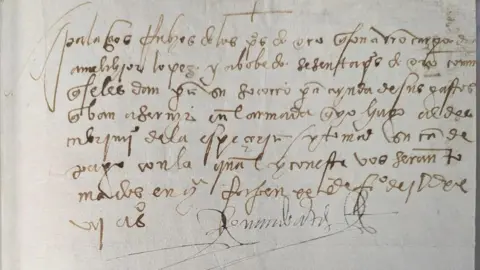The recent return of a stolen document signed by Spanish conquistador Hernán Cortés marks a significant moment in cultural and historical preservation efforts. This 500-year-old manuscript page, which the FBI returned to Mexico, was penned in 1527, during a time of monumental change in the Americas. The document’s repatriation underscores the ongoing dialogue between nations regarding cultural heritage and the reclamation of lost artifacts.
The manuscript is one of fifteen pages believed to have been taken from Mexico’s national archives between 1985 and 1993. It specifically details payments made for supplies related to expeditions during Cortés’s governorship of New Spain. Cortés, a pivotal figure in the history of the Americas, led expeditions that resulted in the downfall of the Aztec Empire and laid the foundation for Spanish colonization. This particular page provides insight into Cortés’s endeavors as he navigated what would eventually become parts of modern-day Mexico and beyond.
This specific document had been a focal point in a larger pursuit initiated by the Mexican government. In 2024, they enlisted the expertise of the FBI’s art crime team to assist in locating the missing pages. The team utilized careful historical documentation and contemporary investigative techniques to track down artifacts that were reported lost. One identifying marker on the recovered page—a number written in wax—indicated that it had been cataloged by Mexican archivists between 1985 and 1986, which was when the thefts were likely to have occurred.
The FBI recently announced that the page was found in the United States, although exact details regarding its location or ownership at the time of recovery have not been disclosed. Special Agent Jessica Dittmer explained that multiple transactions surrounding the document after its theft meant that no prosecution would occur. This acknowledgment reflects a larger problem of artifact trafficking, where historical items frequently change hands in the antiquities market.
Dittmer further emphasized the document’s significance, stating that it enriches the understanding of historical planning and expeditions undertaken by European explorers, framing context for their quest for trade routes to the “spice lands” of Asia. The so-called spice lands refer to regions that were coveted for their valuable resources, prompting explorers to seek alternate routes through uncharted territories like the Americas.
The act of returning this document occurs against a backdrop of rising political tensions between Mexico and the United States, particularly regarding tariffs and immigration policies stemming from previous administrations. Nonetheless, the FBI has embraced its role in preserving cultural heritage, recognizing the importance of safeguarding artifacts like this manuscript for future generations and historical integrity.
This repatriation aligns with broader trends in the United States and other countries, where there have been increasing efforts to return art and cultural heritage items to their countries of origin. For instance, the FBI had previously returned another document signed by Cortés in 2023, showcasing an ongoing commitment to rectify historical injustices regarding cultural artifacts.
As discussions around colonialism and the ethical implications of historical acquisitions continue, the importance of initiatives like those undertaken by the FBI becomes increasingly evident. Such actions not only foster international cooperation but also facilitate a deeper understanding and appreciation of diverse histories that resonate with people worldwide. The FBI has indicated its intent to continue the pursuit of the other missing pages from the collection, further underscoring its dedication to this cause as part of a more extensive mission to combat the trafficking of antiquities.
In conclusion, the return of this document enhances the narrative of cultural recovery between nations, emphasizing the principle that artifacts represent valuable insights into the histories and identities of their countries. Through continued collaboration and accountability, it is hoped that more such documents and artifacts will find their rightful homes, thereby enriching the collective comprehension of global history.











